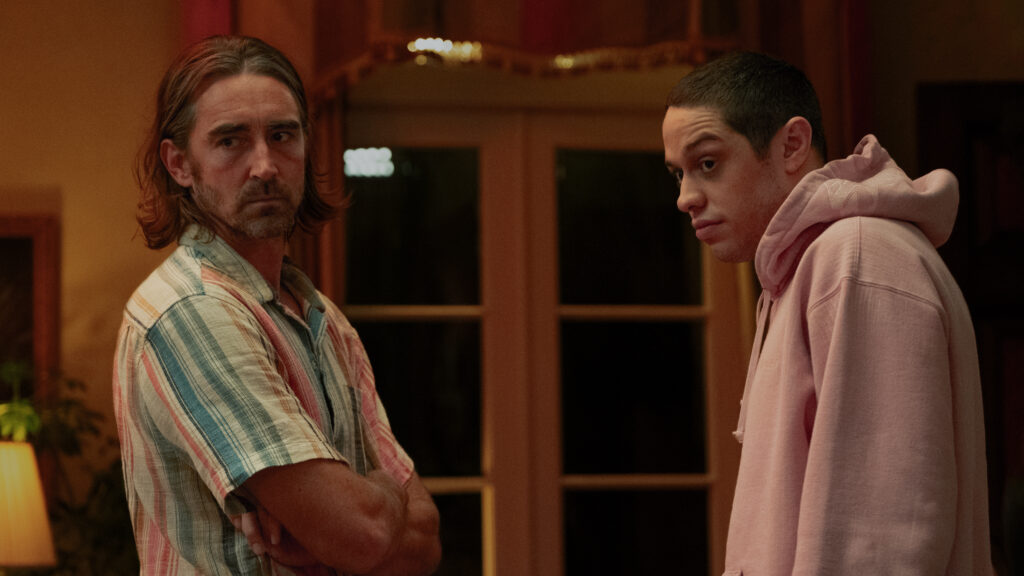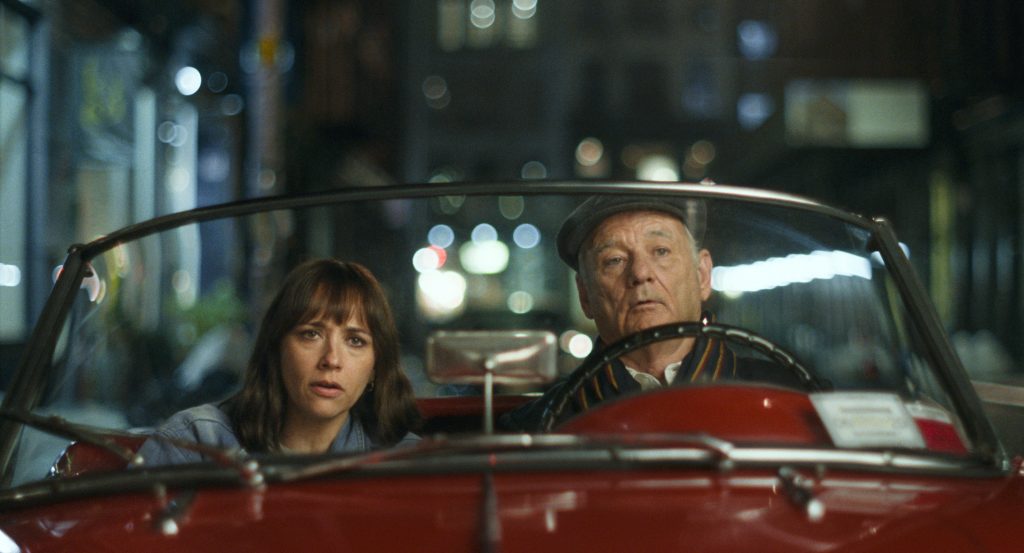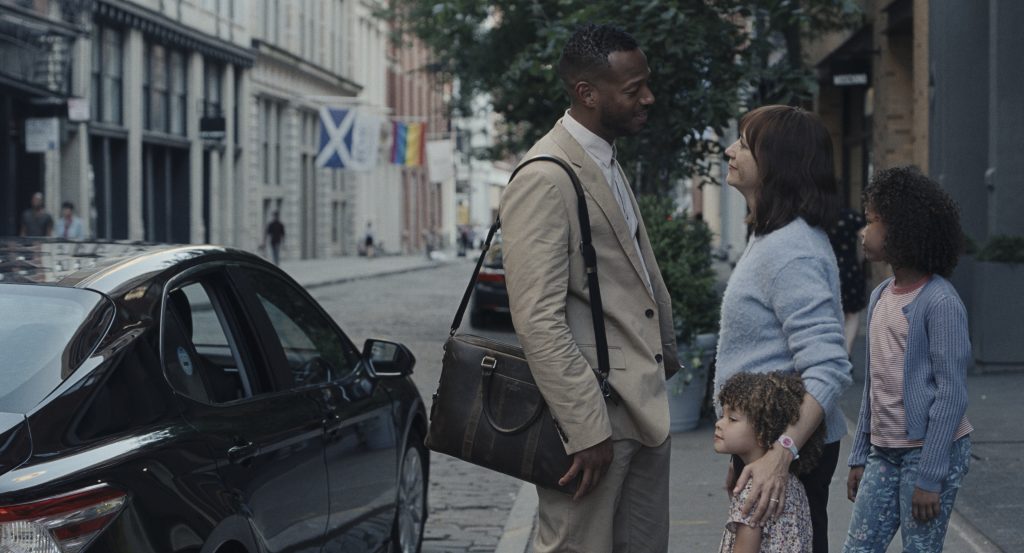August 6, 2022
by Carla Hay

Directed by Halina Reijn
Culture Representation: Taking place in an unnamed city in New York state, the horror film “Bodies Bodies Bodies” has a racially diverse cast of characters (African American, white and one biracial Asian) representing the wealthy, upper-midde-class and working-class.
Culture Clash: During a hurricane, seven people partying in a mansion decide to play a murder mystery game, but then some people at this party really end up getting killed.
Culture Audience: “Bodies Bodies Bodies” will appeal primarily to people who are fans of horror movies that mix raunchy comedy with a suspenseful mystery.

“Bodies Bodies Bodies” capably serves up suspense and social satire, despite a few plot holes and an overload of pop culture and slang that will inevitably make this horror movie look very dated. It’s a time capsule of Generation Z (people born between 1997 and 2012) in their 20s, and all the technology that affects their relationships and perceptions of each other. In other words, it’s not a throwback to slasher flicks from the 20th century. This is a horror movie about people who don’t know what it’s like to live life without the Internet, for better or worse. Except for one person, all of the characters in “Bodies Bodies Bodies” are supposed to be in their early-to-mid 20s.
Directed by Halina Reijn and written by Sarah DeLappe, “Bodies Bodies Bodies” had its world premiere at the 2022 SXSW Film Festival in Austin, Texas. The movie makes the most out of the relatively small number of people in the cast and the fact that “Bodies Bodies Bodies” primarily takes place in one location: a mansion in a remote, mountanous area somewhere in New York state. (“Bodies Bodies Bodies” was actually filmed in Chappaqua, New York.)
In many ways, “Bodies Bodies Bodies” follows the same formula of dozens of other horror movies where young people gather in an isolated area; indulge in sex, drugs and mind games; and are killed off, one by one. However, the movie’s snappy dialogue and a twist ending make “Bodies Bodies Bodies” slightly better than the average horror flick. It isn’t a movie where people are killed indiscriminately, because it’s shown exactly why each person was killed.
The opening scene of “Bodies Bodies Bodies” lets viewers know that this is a very queer-friendly movie, where the sexualities of the characters can be fluid, and if other people are uncomfortable about it, they don’t really care. The movie’s first scene is a close-up of new couple Sophie (played by Amandla Stenberg) and Bee (played by Maria Bakalova) passionately kissing each other. They also tell each other, “I love you.” It’s mentioned a little later in the movie that Sophie and Bee have been dating each other for the past six weeks.
Bee and Sophie have almost opposite personalities: Sophie is a risk-taking extrovert. Bee is a cautious introvert. Sophie and Bee are about to take a road trip to the aforementioned remote mansion to party with some of Sophie’s friends who were her schoolmates in high school. Sophie has known a few of these friends before they were teenagers. Bee is very nervous about this trip—and not because she will be meeting Sophie’s friends for the first time.
Bee has some other social anxieties. Bee is an immigrant from an unnamed Eastern European country and comes from a working-class background, while Sophie is an American whose family is rich. (Bakalova, the Oscar-nominated actress from 2020’s “Borat Subsequent Moviefilm,” is actually from Bulgaria.) Sophie is openly queer. However, Bee is also not completely “out of the closet” as a queer woman. Many of Bee’s family and friends don’t know yet that Bee is queer and dating Sophie.
Sophie’s got her own issues. Conversations in the movie reveal that Sophie is a recovering drug addict and alcoholic. When she was a student at New York University, Sophie had at least one overdose and mental breakdown. She has also spent time in drug rehab and psychiatric facilities. It’s never mentioned if Sophie graduated from NYU, but it’s implied she probably dropped out of college because of her personal problems. Sophie doesn’t appear to have any life goals at the moment except to try to stay clean and sober and enjoy life as much as possible.
The mansion is owned by the parents of spoiled and obnoxious David (played by Pete Davidson), who is yet another stereotypical stoner that Davidson seems to play in his most recent movies. Before Sophie and Bee go to the mansion, Sophie tells Bee that David was Sophie’s “pre-school boyfriend, before I realized I was a raging dyke.” No one’s parents are seen in this movie, but it’s mentioned that all of Sophie’s childhood friends come from affluent families.
Because of his abrasive personality, David is someone who has friends who don’t really like him, but they tolerate him because he’s generous when it comes to partying and sharing some of his wealth. Just like Sophie, David doesn’t seem to know what he wants to do with his life, and his family is rich enough to financially support him. David is the type of braggart who has to prove to everyone that whatever they can do, he can do better.
When Bee and Sophie arrive at the mansion, the small party is in full swing in and around the swimming pool. Sophie is warmly greeted by everyone, while Bee shyly offers a party gift: homemade zucchini bread. The other people at the party (except for Sophie) think this gift is very unsophisticated and old-fashioned, and they react with either rude haughtiness or amusement. Sophie tries to make Bee more comfortable, but Bee can immediately sense that she will have trouble fitting in with this group of bratty snobs.
The other people at the party are David’s insecure girlfriend Emma (played by Chase Sui Wonders), an actress who’s been in a relationship with David for the past six years; free-spirited but flaky Alice (played by Rachel Sennott), a podcast host who likes to wear glow sticks as jewelry; scruffily handsome and goofy Greg (played by Lee Pace), who is in his 40s and is having a fling with Alice; and brooding Jordan (played by Myha’la Herrold), who has unresolved romantic feelings for Sophie. Jordan is the only one in the group who is not part of a couple, so her “romantically unattached” status affects some of the tensions and jealousies that happen later in the story.
Some viewers might not like how long it takes for “Bodies Bodies Bodies” to actually get to any horror. The first third of the movie is really about showing the dynamics between these seven people when they’re partying and trying to prove to each other how “cool” they are. Alice met Greg on the dating app Tinder, and they’ve only known each other for less than a week. David is threatened by Greg’s physical attractiveness, so David attempts to demean Greg’s masculinity by trying to make Greg feel “old” and out-of-touch.
A hurricane quickly forces the party to go indoors, where there’s the inevitable electrical power outage, so that people can’t use their phones or WiFi service to communicate. No electricity also means that much of the movie is dark and shadowy, except for lights from candles, flashlights, cell phones or Alice’s ever-present glow sticks. Sophie notices that Jordan has been flirting with Bee. And so, as a distraction and in order to liven up the party, Sophie tells everyone that they should all play a game called Bodies Bodies Bodies.
Bodies Bodies Bodies is a murder mystery game, where slips of paper are distributed to all the players. The player who gets the paper slip marked with “x” is the designated murderer, who has to “kill” as many of the other players as possible. The potential victims can hide wherever they want to avoid being killed. Someone can win the game in one of two ways: By being the first potential victim to prove who the killer is, or by being the killer and getting away with all of the murders. And because “Bodies Bodies Bodies” is a horror movie, the killings turns out to be real.
A potential outlier in the story is a character named Max (played by Conner O’Malley), another friend in this clique, who was at the party the night before. However, no one really knows where Max is during the killings because he left the party the previous night, after getting into a fist fight with David. (It’s why David has a black eye.) The reasons for this altercation are later revealed in the movie. Max is not seen for most of the movie, but his name comes up multiple times in the increasingly paranoid and frantic conversations, and as the body count continues to pile up.
With a soundtrack that’s heavy on electronic dance music and hip-hop, “Bodies Bodies Bodies” wants to have a very “of the moment” vibe to convey a pulse-pounding nightclub of the early 2020s. But at this party, people’s pulses are pounding because they’re terrified that they’re trapped in this mansion with a serial killer on the loose. The hurricane outside won’t put off some people from trying to get away by car. But it should come as no surprise when “Bodies Bodies Bodies” has a horror movie cliché: a car that won’t start when people want it to start.
“Bodies Bodies Bodies,” which has good performances all around from the cast members, is at its best in revealing of some of the secrets and lies within this group of characters. The arguing can get a little tedious and annoying, but not so grating that it overtakes the movie’s horror angles. That’s because there’s enough comedy in the dialogue in the movie’s self-aware way of showing that these self-absorbed and sometimes-cruel characters mostly deserve to be mocked. Bee is the only one who seems to be immune to the group’s ridiculous ego posturing and whiny antics, but she’s no angel either.
Some of the plot developments in “Bodies Bodies Bodies” are a little on the implausible side. On the other hand, it is very believable that people in a panic can do a lot of things without thinking logically. People will either love or hate the ending of “Bodies Bodies Bodies.” Regardless of how viewers feel about how the movie ends, “Bodies Bodies Bodies” offers some sly commentary on some people’s preoccupation with creating lives and images on the Internet that are often quite different from reality. This preocupation can lead to misperceptions and manipulations that can be their own kinds of horror stories.
A24 released “Bodies Bodies Bodies” in select U.S. cinemas on August 5, 2022. The movie’s release expands to more U.S. cinemas on August 12, 2022.


